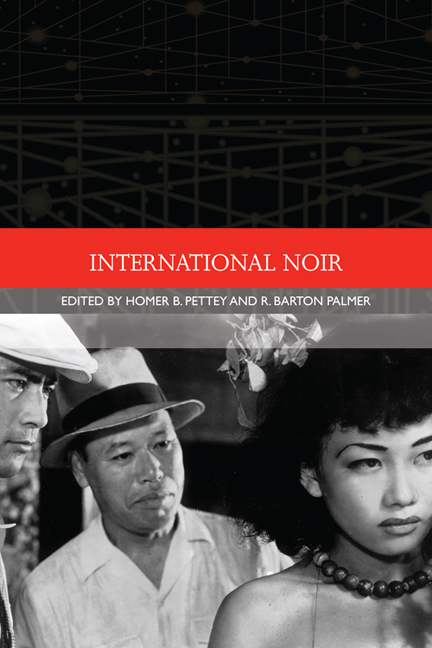Book contents
- Frontmatter
- Contents
- List of Illustrations
- Acknowledgements
- Notes on the Contributors
- Traditions in World Cinema
- Introduction: The Noir Impulse
- 1 British Noir
- 2 French Noir 1947–79: From Grunge-noir to Noir-hilism
- 3 French Neo-noir: An Aesthetic for the Policier
- 4 Early Japanese Noir
- 5 The Gunman and the Gun: Japanese Film Noir since the Late 1950s
- 6 Darker than Dark: Film Noir in its Asian Contexts
- 7 Nordic Noir and Neo-noir: The Human Criminal
- 8 Indian Film Noir
- 9 The New Sincerity of Neo-noir
- 10 Post-noir: Getting Back to Business
- Selected Bibliography of International Film Noir
- Selected Filmography of International Film Noir
- Index
6 - Darker than Dark: Film Noir in its Asian Contexts
Published online by Cambridge University Press: 05 August 2016
- Frontmatter
- Contents
- List of Illustrations
- Acknowledgements
- Notes on the Contributors
- Traditions in World Cinema
- Introduction: The Noir Impulse
- 1 British Noir
- 2 French Noir 1947–79: From Grunge-noir to Noir-hilism
- 3 French Neo-noir: An Aesthetic for the Policier
- 4 Early Japanese Noir
- 5 The Gunman and the Gun: Japanese Film Noir since the Late 1950s
- 6 Darker than Dark: Film Noir in its Asian Contexts
- 7 Nordic Noir and Neo-noir: The Human Criminal
- 8 Indian Film Noir
- 9 The New Sincerity of Neo-noir
- 10 Post-noir: Getting Back to Business
- Selected Bibliography of International Film Noir
- Selected Filmography of International Film Noir
- Index
Summary
CHINESE AND KOREAN NOIR
This chapter focuses on film noir in the contexts of the Hong Kong and South Korean cinemas, two Asian film industries that have produced some of the most remarkable films noirs of the contemporary era. If Asian noir is seen as a later phenomenon in the development of film noir in world cinema, South Korean cinema has produced some of the most striking examples of neo-noir in the past ten years or so and it may be argued that South Korean filmmakers have inherited a wider tradition of noir cinema in the world and simply perpetuated it within their own industry. However, from an Asian cinema perspective, the South Korean films are part of a tradition that arguably stretched back to the Hong Kong cinema's New Wave which materialised in 1979 through the first feature films of Ann Hui (The Secret), Tsui Hark (The Butterfly Murders), Alex Cheung (Cops and Robbers) and Peter Yung (The System). All of these are films noirs in their conscious conveyance of a ‘new mood of cynicism, pessimism, and darkness’, as Paul Schrader has defined noir in his seminal article ‘Notes on film noir’. The Hong Kong New Wave simply infused this mood into the Asian cinema mainstream which at the time was mostly dominated by Hong Kong martial arts pictures, comedies and romantic melodramas. So pervasive was the noir sensibility in the Hong Kong New Wave films that it was not so much a New Wave as a Noir Wave. The New Wave generation of directors sought to suture the tone and sensibility of noir into the body fabric of Hong Kong cinema as a kind of collective mood-motif which had not really been present before. Noir's manifestation in Hong Kong cinema can be attributed to the fact that many of the New Wave directors were educated in the West and had brought back with them Western influences. The 1970s was a time of transition in which the dawn of the New Wave marked a modernist phase of development in Hong Kong cinema which had, after all, patterned itself after Hollywood. As noir took critical hold in the American critical discourse during the 1970s (Paul Schrader's ‘Notes on film noir’ was first published in 1972), Hong Kong was affected one way or another.
- Type
- Chapter
- Information
- International Noir , pp. 136 - 154Publisher: Edinburgh University PressPrint publication year: 2014



